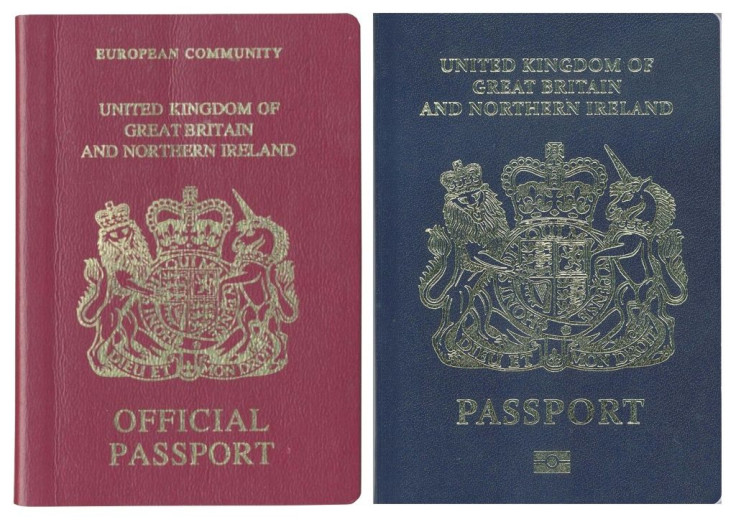Post-Brexit U.K. Passports Made In Poland By French-Dutch Firm

KEY POINTS
- Gemalto, a French-Dutch digital security company
- British passports featured blue covers from 1921 to 1988
- Since 2016, almost 360,000 U.K. citizens applied citizenship in other EU states
The new British passports to be issued in March – the first batch produced after the U.K. left the European Union – will feature the classic navy blue color scheme of old passports, but they will be manufactured in Poland by Gemalto, a French-Dutch digital security company. (Poland, France and Holland are all EU members)
British passports featured blue covers from 1921 to 1988, when they switched to burgundy color similar to other EU passports
Current U.K. passports will be valid until their expiration dates.
"By returning to the iconic blue and gold design, the British passport will once again be entwined with our national identity and I cannot wait to travel on one," stated British Home Secretary Priti Patel.
The Home Office said that “full introduction will be phased in and from mid-2020 all new passports will be blue.”
In addition, the new passport’s back cover will for the first time carry the embossed floral emblems of England, Northern Ireland, Scotland, and Wales.
Prime Minister Boris Johnson had previously said in 2017 the color change from burgundy back to blue was a "wonderful thing" and referred to his "sense of personal loss and outrage" when the U.K.'s old blue passports were "taken away" in 1988.
The new passport will also include new security features, including a “hard-wearing, super-strength polycarbonate data page, which contains innovative technologies embedded into the document, to keep personal data secure.”
It also includes the “latest and most secure printing and design techniques,” which will provide “better protection against identity theft and fraud and will be even harder to forge.”
Seb Dance, a former Member of the European Parliament who advocated that Britain remain in the EU, said sarcastically of the new passport: "I actually like the French-designed Polish-printed new U.K. passport. Of course the previous one -- which allowed Brits the right to work, study and retire freely across their own continent -- was probably more useful."
Another former British MEP Edward McMillan-Scott condemned the new passports, saying they "symbolize [a] prevailing Tory attitude to [the] rest of Europe: isolationist, ignorant and self-destructive."
Gemalto, a subsidiary of the French group Thales, had received a $335 million contract to make the passports in 2018 by then Prime Minister Theresa May. At that time Patel called it "a national humiliation" that they would be made by a foreign company.
A British company called De La Rue plc had lost in the bidding process for the new passports to Gemalot.
At that time, De La Rue’s chief executive Martin Sutherland asked May to “explain to my dedicated workforce why it’s sensible to offshore the manufacture of a British icon.”
He added: “I’m going to have to go and face [our] workers, look them in the whites of the eyes and try and explain to them why the British government thinks it’s a sensible decision to buy French passports not British passports.”
Separately, thousands of British nationals have been applying for passports of other EU countries in order to obtain dual citizenship in preparation for Brexit.
The Guardian reported that more than 50 British citizens working for the European Commission in Brussels have received Irish passports, in order to improve their chances for career advancement.
Under Irish laws, anyone who has an Irish parent, or a grandparent born in Ireland can receive an Irish passport.
In January, more than 1,400 other British nationals living in Belgium received Belgian passports, up from 506 in 2016 and 127 in 2015.
On the whole, since 2016, almost 360,000 U.K. citizens have applied citizenship in other EU countries, in some cases even sacrificing their British passports in countries where dual citizenship is not allowed.
© Copyright IBTimes 2025. All rights reserved.





















